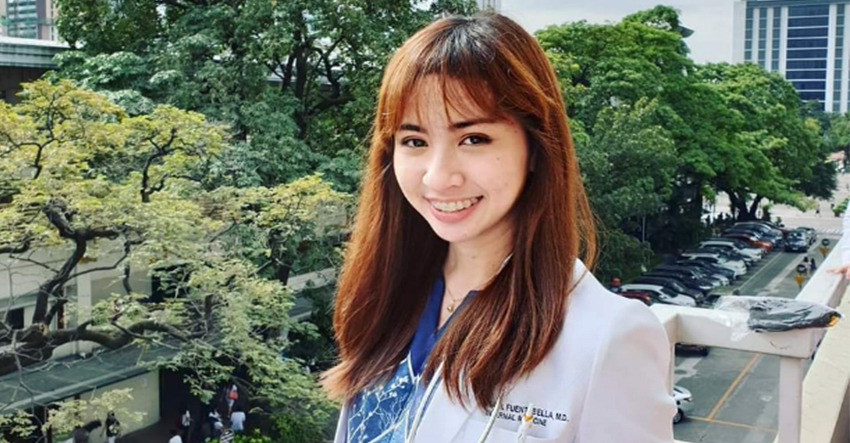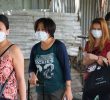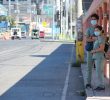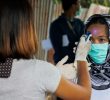
Dr.Carmina Fuentabella (Contributed photo)
It was not the first time I heard about her story, but hearing it from her was inspiring.
Last June 11, I attended this webinar from the Association of the Medical Doctors of Asia that featured this frontliner, an Association of Medical Students of Asia (AMSA)-Alumni, who recovered from Covid-19 and the horrors it brought to her.
The speaker is Doctor Carmina Fuentabella, a resident doctor at the University of Santo Tomas (UST) hospital. She said she once dreamed of becoming an animator along with becoming a physician. But she was successful in pursuing the latter.
She is not a typical girl from the province, as she admitted growing up with a family having less trouble finding food for the table. She was blessed with a family that gave her a life a little lot more comfortable than the character of Mulan. She was however like any other girl who has dreams, wishes and problems beyond her state.
Carmina may not really have the problem of working hard to support her family. She is, however, not free from life’s trials. She had to face crises of self-esteem, career, and identity through her course. She had reached points in her life where she’d like to give up, not once, but a couple of times. But Carmina never gave up in every trial and discouragement she felt, in school, medical practice, until eventually finding what she thought was the life she wanted – a doctor full of confidence, filled with happiness and bright.
Then, the coronavirus disease came. As a resident doctor in a private hospital, she was among the “frontliners” in the battle against the fast-spreading deadly disease. She had to attend to patients both suspected and positive of infection.
Like Moana and Mulan, the challenge seemed easy at first to Carmina, treating the situation lightly like it was another hurdle to pass. But like the heroines in stories, they finally face what they thought would be impossible to cross alive.
Carmina eventually contracted the disease at the onset of the battle, when most medical “frontliners” had less personal protective equipment’s (PPE) to put on.
The infection was a lot more complex than that of other patients, as Carmina had to be intubated and sedated. Pain was her companion at first, and suffering was hell, she described her condition then.
Carmina was however not alone in the battle. Like heroes in Disney stories, she had her family, friends and colleagues at her back, praying, encouraging and pushing her to fight. They mounted a collage of photos showing her family, friends and memories with that intend to inspire her to continue to live and never give up.
To her surprise, she even had people who read about her on social media sending prayers and inspiring messages for her.
Then the flare of hope. Like in impossible-to-survive-struggles in Disney stories, when you are almost about to give up, you see people pushing you up to fight on and you see that spark of life. Among the images she would see in the photo wall was that of the cherry blossoms of Japan.
Seeing these flowers in Japan is one of her fondest dreams in life. In fact, she was already scheduled to fly to that country to make this simple dream come to life.
It’s almost a coincidence, or an act of spiritual intervention, or simply perhaps faith translated into a miracle, that the cherry blossoms, or sakura in Japan, are actually a symbol of rebirth as it always signals the coming spring, an opportunity for renewal, a beacon of hope.
This flicker of hope somehow helped Carmina gather up her senses, and managed to eventually take in all that is happening to her, within her and around her, and realized that people were mobilized to help keep her alive and to inspire her to fight for survival, until she was ready to take on the battlefield determined to fight and finally survive the struggle.
Carmina survived the fight against the coronavirus disease with the help of her colleagues in UST, the medical community, her friends and her family, multiplied by other people’s prayers for her, sparked by her dream of seeing the cherry blossoms of Japan, and fortified by her faith in God.
“What did I do to deserve this,” she asked. But somehow, it was God’s way of showing her that, “life is too beautiful to give up. Some people see me as a symbol of hope, but it was everyone that became my source of strength to overcome during this ordeal,” she said seeing this as a way of paying gratitude to everyone.
For patients, she said that getting caught with the virus can make one want to give up “but there will always be a reason to keep fighting.”
Dr. Carmina Fuentabella was never discouraged to still work in the front lines. She vowed to continue doing so, if opportunity allows it. (davaotoday.com)










